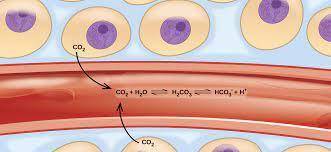a)caco3(s) → cao(s) + co2(g)

Chemistry, 01.10.2019 17:30 douglife8057
Which of the following is a process with a negative δs?
a)caco3(s) → cao(s) + co2(g)
b)co2(s) → co2(g)
c)none of the choices are correct because δs cannot be negative.
d)dissolving sugar in water
e)h2o(l) → h2(s)

Answers: 1


Other questions on the subject: Chemistry



Chemistry, 22.06.2019 09:10, cheesedoodle
When a nucleus absorbs a neutron and then breaks apart, there are many products of the reaction. what is not a product of a nuclear fission reaction
Answers: 1

Chemistry, 22.06.2019 13:10, Jana1517
The last few miles of the marathon are the most difficult for heather, her hair plastered to her head, sweat clinging to her arms, and her legs already feeling as if they had nothing left, just dead weight. after grabbing a cup of ice water, she feels the ice cubes smash against her nose as she gulps some cool refreshment and keeps on running. in these last few miles, the breeze kicks up and she finally feels some coolness against her skin. drips of sweat, once clinging to her forehead, now spill down, and heather feels more pain as the sweat flows into her eyes. which of the following is the most likely reason why the ice struck heather’s nose when she took a drink? a) water can function as a solvent. b) water can store large amounts of heat. c) water can moderate temperatures through evaporative cooling. d) the density of water decreases when it freezes. e) water has a cohesive nature. sweat remained on heather’s forehead and arms because of the a) high salt content of sweat b) cohesive nature of water c) ability of water to moderate heat d) high evaporative cooling effect of water e) ability of water to act as a solvent
Answers: 1
You know the right answer?
Which of the following is a process with a negative δs?
a)caco3(s) → cao(s) + co2(g)
a)caco3(s) → cao(s) + co2(g)
Questions in other subjects:


Mathematics, 20.04.2020 20:13



Mathematics, 20.04.2020 20:13


History, 20.04.2020 20:13






